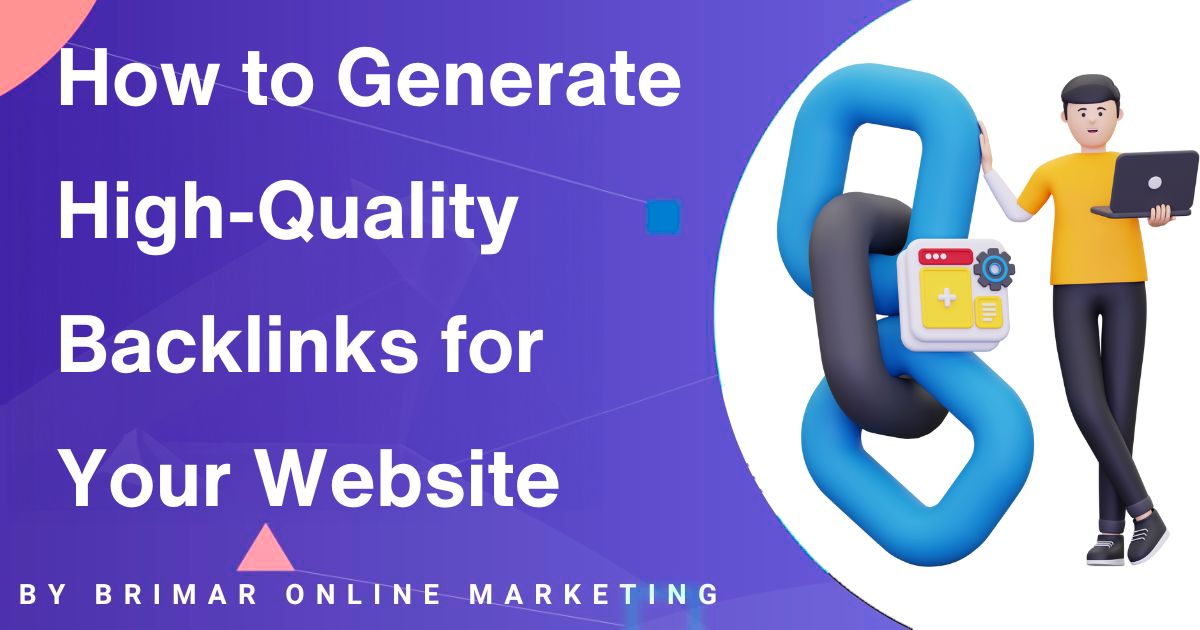
Backlinks form the foundation of a robust online presence.
Consider them as suggestions from others websites.
They signal to search engines that your content is trustworthy and worth sharing.
But not all backlinks are created equal; the high-quality ones truly matter.
These links help elevate your search engine rankings, drive targeted traffic, and build credibility for your brand.
When you focus on securing valuable backlinks, you improve your ranking in search results and strengthen your website’s reputation and visibility in your industry.
The good news?
There are proven strategies to make this happen.
This guide will walk you through effective, practical methods for generating backlinks that work.
From creating link-worthy content to building meaningful relationships with website owners and leveraging tools for smarter outreach, you’ll discover the best ways to turn your efforts into results.
Whether you’re just starting or looking to refine your approach, these tips will help you build a solid foundation for success.
Let’s dive in!
Understanding Backlinks and Their Importance
Backlinks act as endorsements for your website.
When another site links to yours, it’s essentially saying, “This content is valuable and worth checking out.”
However, not all backlinks are created equal.
Let’s break down the key types of backlinks you’ll encounter:
- Inbound Links: These links from a different website guide users. They’re often referred to as “good backlinks” when they come from trusted, high-domain authority sites because they help establish your site’s credibility.
- External Links: These are links from your site to other web pages. While they might not seem as exciting as inbound links, they can improve the user experience and provide valuable context for your audience.
- Nofollow Links: These instruct search engines to withhold link equity (or “SEO juice”) from the linked site. While they don’t directly boost rankings, they can still drive traffic and add to your overall backlink profile.
So, why are backlinks such a big deal?
They directly influence your search engine rankings and your site’s visibility in search results.
Search engines such as Google regard backlinks as an indicator of trust authority.
A site with many high-quality backlinks is more likely to rank higher because it’s seen as a valuable resource.
Your link profile, the collection of all backlinks pointing to your site, also plays a critical role.
A strong link profile of links from relevant, authoritative websites builds your site’s credibility and shows search engines you’re a trusted player in your industry.
However, a weak or spammy link profile can hurt your rankings, so it’s essential to focus on quality over quantity.
The bottom line?
Building the right backlinks isn’t just about boosting rankings; it’s about solidifying your reputation, improving your online presence, and ultimately connecting with the right audience.
Start Attracting Customers Through SEO Today!
We can help you attract new customers through Tailored Search Engine Optimization Strategies for Your Business.
Creating Link-Worthy Content
If you want high-quality backlinks, the first step is to make your website irresistible.
Think of it this way: backlinks are like votes of confidence from other sites.
They won’t link to something mediocre; they want something valuable, engaging, and worth sharing.
That’s why producing high-quality content isn’t just important; it’s non-negotiable.
Why High-Quality Content Attracts Backlinks Naturally
When your content provides real value, people notice.
They share it, reference it, and, most importantly, link to it.
Whether it solves a problem, shares insights, or delivers unique data, content that answers questions or adds value naturally attracts backlinks.
It’s not about the quantity; it’s about creating something so exceptional that others feel compelled to link to it.
Types of Content That Earn Valuable Backlinks
Not all content is created equal.
Some formats are better at grabbing attention and earning links.
Here are some suggestions to help you started:
- Case Studies and Original Research
People love data-driven content. If you can publish a case study or original research offering new insights into a particular topic, it will attract backlinks. Whether it’s statistics, trends, or actionable results, unique findings are gold for website owners looking for credible sources. - The Skyscraper Technique
This strategy is simple but powerful: find content already performing well in your industry, then make something even better. Add more detail, update outdated information, improve the design, or include extra resources. Once your improved version is live, reach out to those who linked to the original piece—they’ll often switch their links to your superior content. - Infographics, How-To Guides, and Industry-Specific Resources
Visual and practical content is always a hit. Infographics make complex information easy to digest, while how-to guides walk readers through solving specific problems. Industry-specific resources, like checklists or templates, can quickly position you as a go-to authority. The easier your content makes someone’s life, the more likely they will share and link to it.
Becoming a Valuable Resource in Your Niche
When you establish your website as a trusted resource, backlinks will follow naturally.
Focus on delivering content that’s informative, actionable, and genuinely helpful.
Whether answering common questions, diving deep into niche topics, or creating tools your audience can’t live without, being the go-to site in your field gives other website owners a good reason to link to you.
Great content is the foundation of any successful link-building strategy.
When you focus on quality over quantity, your efforts will pay off in high-quality backlinks that boost your site’s authority and search engine rankings.
Outreach and Relationship Building
When it comes to generating high-quality backlinks, relationships matter.
Think of backlinks as referrals from friends; it’s easier to trust someone who’s vouched for by people you already know.
Building strong connections with website owners, bloggers, influencers, and industry experts opens the door to consistent and valuable backlink opportunities.
Start with outreach emails.
A thoughtful, personalized email can make all the difference.
Instead of generic pitches, show genuine interest in their work.
Highlight specific articles, projects, or ideas you admire, and explain how your content could complement their audience.
Keep it short, authentic, and concise; it’s not about selling but offering value.
Developing strong relationships is key.
Engage with industry professionals on social media, attend virtual or in-person networking events, and participate in discussions where your expertise shines.
People are likelier to link to your content if they know and trust you.
Building these connections takes effort, but it pays off through ongoing collaboration and backlinks.
Guest blogging is another powerful strategy.
By writing guest posts for relevant sites, you’re earning backlinks and showcasing your expertise to a new audience.
Look for blogs or websites in your niche with high domain authority and an engaged audience.
Craft a well-researched, value-packed article that leaves a lasting impression, ensuring the backlink feels natural and beneficial for their readers.
When you focus on creating good relationships with the right people, the opportunities for backlinks multiply.
It’s about establishing a network of professionals who consider your content a valuable resource worth sharing.
Utilizing Tools for Backlink Opportunities

Sometimes, finding backlink opportunities feels like searching for a needle in a haystack.
That’s where SEO tools come in.
Tools like Google Search Console, Ahrefs, and SEMrush make it easier to identify, track, and secure backlinks without guesswork.
One effective way to build backlinks is through broken link building.
These tools can help you uncover broken links on your industry’s resource pages or blog posts.
Once you find them, contact the website owner, inform them about the issue, and offer your piece of content as a replacement.
It’s a win-win: they fix their broken link, and you gain a backlink.
Another useful feature of these tools is the ability to monitor your backlink profile.
This ensures you monitor the quality of the content linking to your site and avoid spammy or irrelevant links that could harm your rankings.
Regular monitoring also helps you spot new backlinks and evaluate their impact on your search engine rankings.
Lastly, competitor analysis is a great way to discover new opportunities.
SEO tools let you analyze competitors’ backlink profiles in your niche, revealing where they’re earning their backlinks.
Use this data to find similar relevant sites that might be interested in your type of content.
These tools don’t just simplify the process; they give you a more precise roadmap to success.
With the right strategy and the help of free tools or paid platforms, finding and securing high-quality backlinks becomes much more manageable.
Leveraging Existing Content and Resources
Sometimes, the best opportunities are already on your website.
Updating your existing content is one of the most efficient ways to turn older resources into fresh, link-worthy material.
Consider it an opportunity to refresh your content life.
Start by identifying outdated resources or posts that still get traffic but need some polish.
Update stats, refresh visuals, and add insights or examples that reflect current trends.
When your content feels relevant and up-to-date, it becomes more attractive to others looking to link to reliable sources.
Case studies, tutorials, and in-depth guides are compelling.
These types of content naturally add value and serve as go-to resources for readers and website owners alike.
When you create content that answers questions or solves problems, you’ll find that backlinks often follow.
Don’t overlook the importance of internal and outbound links.
Strategically linking to other pages on your site improves navigation and boosts user experience.
Meanwhile, including outbound links to high-quality, authoritative sites build credibility.
It’s all about creating a web of resources that makes your site stand out as a trusted source of information.
Finally, repurpose your content into new formats.
A popular blog post can become a short video, an infographic, or even a podcast episode.
Each format opens up opportunities to connect with different audiences, which means more eyes on your content and more chances to earn valuable backlinks.
Building Links Through Social Media and PR

Social media serves as a platform for disseminating content and generating backlinks.
When you share your posts on platforms like LinkedIn, X, or Facebook, you’re putting your work in front of a wider audience, including website owners and industry professionals who may find your content valuable enough to link to.
Press releases are another excellent way to get noticed.
Announcing new launches, achievements, or partnerships through press releases can grab the attention of journalists and bloggers, leading to mentions and backlinks.
Similarly, podcast interviews allow you to tap into new audiences.
When you share your expertise on a podcast, the host often links back to your site, giving you a backlink and exposure to fresh listeners.
Don’t underestimate the value of good relationships.
Collaborate with other professionals in your field to create guest content, co-host webinars, or exchange backlinks.
Cross-promotion builds backlinks and strengthens your network.
When people trust you as a resource, they’re more likely to reference your content and recommend it to their own audiences.
By utilizing social media, engaging with the press, and fostering professional collaborations, you can expand the reach of your content, build authority, and organically attract high-quality backlinks.
It’s about working smarter, not harder.
Advanced Link-Building Strategies
Skyscraper Technique: Outshine Your Competitors
The skyscraper technique is simple yet powerful: find content that’s already performing well in your niche and make something better.
This could mean adding more detail, updating outdated facts, or presenting the information more visually appealingly.
Once you’ve created your masterpiece, promote it to the right people, those who have already linked to similar content.
If your version is genuinely more valuable, there’s a good chance they’ll swap their link for yours.
It’s about showing you’ve made an exceptional effort.
Outreach Emails That Work
Outreach doesn’t need to feel robotic or awkward.
The key is personalization.
Instead of sending generic messages, take the time to research the website owner or blogger you’re contacting.
Reference something specific about their site, like a recent article you enjoyed, and explain why your content is an excellent fit for their audience.
Clarifying that your outreach is about adding value, not just self-promotion, will increase your chances of receiving a response.
Identify Backlink Opportunities with Referral Data
Your top referral sources can be goldmines for backlinks.
Dive into your analytics and see which sites are already driving traffic to you.
These could be ideal candidates for additional collaborations or link-building opportunities.
If they’ve linked to you once, there’s a good chance they’ll be open to linking again, especially if you offer fresh, relevant content they can share with their audience.
Guest Blog Posts on High Domain Authority Sites
Guest blogging isn’t dead; it’s just evolved.
Focus on high domain authority sites that align with your niche and target audience.
When pitching a guest article, ensure it’s tailored to their readers and provides unique insights.
It is not solely about creating a backlink but about establishing oneself as an authority in the field.
When done right, guest blogging can drive traffic, improve your backlink profile, and open doors to new professional relationships.
Best Practices for Backlink Success
Quality Over Quantity
Not all backlinks are created equal.
A single link from a high-authority site can have a more significant impact than dozens from low-quality sites.
Prioritize earning links from reputable websites that align with your niche.
This not only boosts your search engine rankings but also enhances your site’s credibility in the eyes of both users and search engines.
Anchor Text Matters
When creating or earning backlinks, the anchor text (the clickable part of a the link) plays a huge role.
Use anchor text that’s relevant to the target keyword without over-optimizing.
For example, instead of using generic terms like “click here,” go for something descriptive, like “learn more about SEO best practices.”
It’s a subtle but effective way to improve your search engine optimization.
Avoid Shady Practices
While shortcuts like buying backlinks or using link farms might seem tempting, they can do more harm than good.
Search engines are smart enough to spot these tactics, and penalties can be severe.
Focus on earning good backlinks through legitimate strategies like guest blogging, resource link-building, and outreach.
It may take longer, but the results are sustainable and far more rewarding.
Keep an Eye on Your Link Profile
Your backlink strategy isn’t a set-it-and-forget-it deal.
Regularly monitor your link profile to ensure the links pointing to your site are high-quality and relevant.
Tools like Google Search Console or Ahrefs can help you track your backlinks and identify any spammy or irrelevant ones.
Refining your approach based on performance, you’ll stay ahead of the game and maintain a strong, healthy backlink profile.
The Role of Backlinks for Small Businesses

Backlinks can be game-changers for small businesses looking to build their online presence.
Think of them as votes of confidence from other websites that tell search engines, “This site is worth paying attention to.”
These links can be a powerful tool for small business websites to grow brand awareness and stand out in a crowded market.
The key is to focus on your niche.
Instead of trying to appeal to everyone, zero in on a specific topic that directly aligns with your services.
For example, if you’re a local bakery, creating content about “the best ingredients for artisan bread” or “how to decorate cupcakes like a pro” can attract attention from websites in the food and hospitality industry.
Targeting a well-defined niche makes it easier to connect with relevant sites that are more likely to link back to your content.
Backlinks also play a massive role in improving the user experience.
When other websites link to your pages, they help potential customers discover your business and navigate to helpful information.
For example, a local news website linking to your special events page or a recipe blog linking to your catering services creates a seamless path for users to find what they need.
This not only drives traffic but also builds trust with your target audience.
For small businesses, every backlink counts.
Even a single mention from a well-known site can open the door to a new audience and boost your search engine rankings.
And the best part?
With consistent effort, it doesn’t take a massive budget to see results.
Conclusion
Building high-quality backlinks doesn’t happen overnight, but it’s worth every bit of effort.
There are many ways to strategically build your backlink, from creating great content and using the skyscraper technique to crafting effective outreach emails and leveraging guest posts.
It all comes down to consistency.
Focusing on the quality of the content, targeting relevant sites, and building good relationships with other website owners will always lead to better results than trying to cut corners.
While backlinks are powerful, pairing them with other SEO best practices will maximize your impact.
Don’t forget to track your progress.
Use free tools like Google Search Console or premium SEO tools to monitor your backlinks, spot opportunities, and refine your strategy.
And if it ever feels overwhelming, consulting with SEO experts can provide the extra guidance you need to stay on track.
Remember, every backlink is a step closer to better search engine rankings, increased brand awareness, and a more substantial online presence.
Now’s the time to implement these tips and watch your hard work pay off.
Our SEO Services Have Helped Our Clients Increase Their Revenue!
“I highly recommend Brimar if your looking to grow your online business. You will be satisfied with the high level of expertise and high quality of services. It has helped my business grow by leaps and bounds.”
CEO
